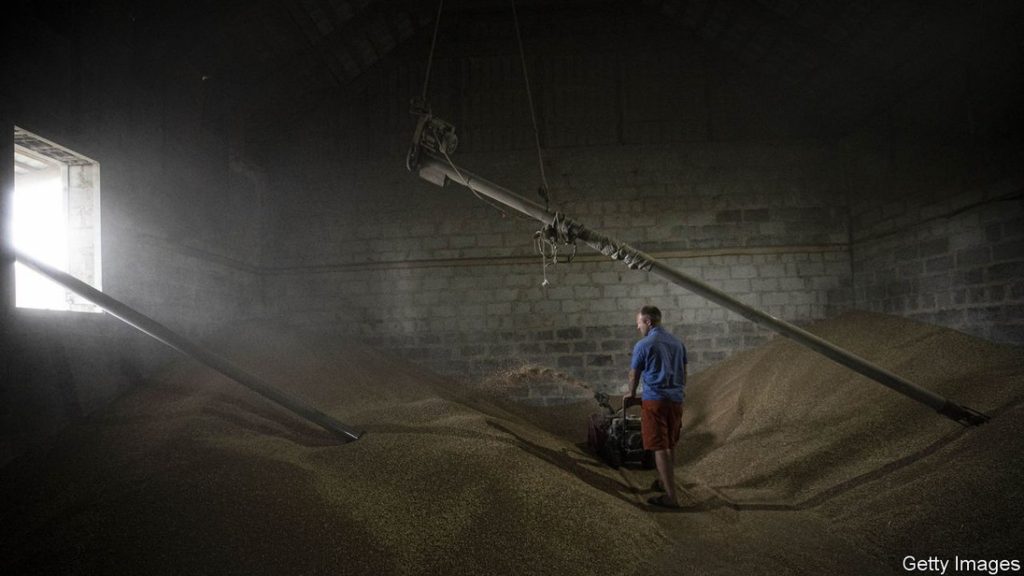
ISTANBUL AND WASHINGTON, DC — AFTER FIVE months of bloody fighting between Ukraine and Russia, on July 22nd the countries’ envoys shook hands stiffly in Istanbul to seal a deal intended to reopen Ukrainian ports for the export of grain to a hungry world. As world wheat prices fell by more than 6%, reverting to pre-war levels, António Guterres, the UN secretary-general, hailed the accord as “a beacon on the Black Sea”. The deal did not favour one side or the other, he insisted, but the whole world.
It did not come a moment too soon for the world’s poorest. The UN says 828m people are going hungry every night, and that 50m in 45 countries are on the brink of starvation. The rest of the world, struggling with high inflation, will hope for some relief from the cost-of-living crisis. Ukraine is one of the world’s most important exporters of wheat, barley, corn and sunflower oil. But it has been unable to ship most of its crops since the start of the war in February. Russia has captured Ukraine’s ports in the Sea of Azov and blockaded those on the Black Sea; Ukraine has mined its own waters to prevent an amphibious invasion.
In Istanbul the envoys from the warring sides—Sergei Shoigu, Russia’s defence minister, and Oleksandr Kubrakov, Ukraine’s infrastructure minister—sat as far apart as they could at a long table, separated by Mr Guterres and Recep Tayyip Erdogan, Turkey’s president. They did not sign an agreement with each other, but rather separate accords with the UN. As well as allowing food shipments from Odessa and two other ports, the UN says the deal will also facilitate the export of Russian fertiliser. (Western sanctions exempt Russia’s agricultural trade, but America and Europe promise to deal with the indirect “chilling” effects, too.)
The accord would create a “joint co-ordination centre” (JCC) in Istanbul, staffed by the belligerents as well as Turkey and the UN. It would oversee the passage of cargo ships in and out of Ukrainian ports, and inspect them to ensure they do not carry “unauthorised cargoes” (ie, weapons). No Russian representatives will be allowed in Ukrainian ports, as had been mooted at one point. And Ukraine insisted that Russian warships would not be allowed to escort cargo vessels.
Instead, Ukrainian pilots will guide ships in Ukrainian waters. Inspections of transport ships will be carried out by the JCC in Turkish ports. “In case of provocations, an immediate military response,” tweeted Mykhailo Podolyak, an adviser to Ukraine’s president, Volodymyr Zelensky. The deal will be valid for renewable periods of 120 days.
But it has large gaps. The route of the “maritime humanitarian corridor” is yet to be set; so is the minimum distance from it that military ships, aircraft or drones would be required to maintain. It is not clear who would do the de-mining needed to clear a sea passage to Ukraine. The UN admits it has no means of enforcement.
Nor is there any sign that the agreement will lead to a wider peace deal. Instead, it amounts to a de facto ceasefire at sea. The sides agreed that they “will not undertake any attacks against merchant vessels and other civilian vessels and port facilities”. The agreement may have been enabled partly by the recent shift in the naval balance of power following several developments: the eviction last month of Russian forces from Snake island; the sinking of the Moskva, Russia’s flagship in the Black Sea; and the reinforcement of Ukrainian coastal defences with the delivery of Western missiles.
With Western help, Ukraine has been trying to expand alternative export routes—down the Danube river and by rail and road to western Europe. But the limited capacity of these routes cannot make up for the Black Sea ports. Ukraine has been exporting only about 2m tonnes of grain a month, compared with about 5m-6m a month before the war. Worse, those silos that have not been destroyed in the war are half-full. With about 60m tonnes of grain expected from this year’s crop now starting to be harvested, Ukraine lacks storage for about 15m-18m tonnes of grain. If the crops cannot be shipped out soon, much will be left to rot.
The Istanbul deal would let Ukrainian farmers sell more of their product, and so earn more money to buy seeds and fertiliser for next season’s planting. Two other factors are helping lower world prices. One is that the harvest in the northern hemisphere is going well; Russia is expected to bring in a record wheat crop of about 90m tonnes. A second is the strength of the dollar, which makes dollar-denominated commodities more expensive for many buyers and creates an incentive for farmers to bring more of their crop to market.
Even so, the food crisis is not over. Grain prices may be down one-third from their peak earlier this year, but they are 40% higher than in January 2020. Fuel, fertiliser and other inputs remain expensive. And a long war looms: fighting may extend into 2023. That raises the question of whether the deal can really hold, and how much food Ukraine can produce.
Assuming the deal does stick, it is unclear how soon it can take effect. It will probably be one to two months before the first ships—expected to be those trapped in Ukrainian ports since the start of the war—can set sail. Getting new ships into port will take longer given the need to set up the monitoring mechanism, find willing shipowners and crews, and negotiate the necessary insurance cover.
Michael Magdovitz of Rabobank, a Dutch lender, nonetheless reckons Ukraine might be able to double its export capacity to about 4m tonnes a month, not far off the pre-war figure. But if there are delays and vessels cannot leave Odessa by October, he added, some of the crop may be lost. Any hold-up in the deal may cause more market turmoil. “There is tremendous upside risk to prices if this falls apart,” says Mr Magdovitz. “The market will skyrocket.”
Many wonder whether the deal is too good to be true. “I struggle to see what’s in it for the Russians,” says an executive from a big agricultural-products trading firm. After all, Mr Putin has broken previous ceasefire agreements in Ukraine. And why would he throw Ukraine an economic lifeline when his forces are struggling to inch forward on the battlefield?
Alexander Gabuev of the Carnegie Endowment for International Peace, an American think-tank, argues that Mr Putin’s U-turn is largely a response to pressure from friendly countries in and around the Middle East—not least Turkey, which now serves as an important economic channel between Russia and the outside world. “When it comes to the Kremlin’s geoeconomic war against the West,” tweeted Mr Gabuev, “Moscow still has plenty of sharp objects in its toolbox beyond grain exports—and gas is the most powerful one.”
By The Economist




